


On February 8-9 2024, IDFI hosted the International Good Governance Forum, titled “Advancing Good Governance: Best Practices and Challenges on the Path towards EU Integration”. The Forum was organized by the Institute for Development of Freedom of Information (IDFI), with the financial support of The Swedish International Development Cooperation Agency (Sida), with additional co-funding from the United Nations Development Programme (UNDP) and the UK Government, USAID National Governance Program, the USAID Economic Governance Program, UN Women Georgia, EU Global Facility on AML/CFT Program, and Open Government Partnership (OGP). It was the fifth event in a series of Good Governance Forums (GG Forum) held annually in Georgia since 2019, gathering international experts, representatives of governments, civil society, the private sector, and international community, with the goal of advancing the good governance reform agenda by raising awareness, exchanging best practices, and fostering debate.
The 2024 GG Forum aimed to closely examine the primary challenges faced by EU candidate countries and to evaluate the importance of good governance reforms in achieving the goals of democratic consolidation.
A welcome speech was given by MR. Giorgi Kldiashvili together with H.E. Mark Clayton, British Ambassador to Georgia, Mr. Douglas Webb - UNDP Resident Representative a.i. in Georgia, Mr. Nicholas Cendrowicz - Head of Cooperation, EU Delegation to Georgia, Mr. Erik Illes - Head of Development Cooperation and Deputy Head of Mission of Sweden to Georgia, and Ms. Corinne Rothblum - Deputy Director, Office of Democracy, Rights, and Governance (DGR), USAID/Georgia
In their opening remarks, the speakers collectively emphasized the crucial role of the Good Governance Forum 2024 as a significant platform for advancing principles of good governance and sharing experiences. Mr. Giorgi Kldiashvili, the Executive Director of IDFI, highlighted the Forum as a vital platform for exchanging best practices and fostering international cooperation in the realm of good governance. H.E. Mark Clayton reiterated the importance of good governance reforms, particularly in the context of Georgia's aspirations towards EU and NATO membership. He emphasized that good governance is not merely a theoretical concept but holds tangible impacts on citizens' lives, serving as a foundational element of democracy and progress. Mr. Douglas Webb stressed the significance of shared experiences and collaboration among nations, particularly within the Balkan and Eastern Partnership countries, as well as the essential role of civil society in holding stakeholders accountable. Mr. Nicholas Cendrowicz highlighted the Forum's relevance during Georgia's journey towards European integration, particularly after achieving candidate status. He emphasized the EU's steadfast support for good governance reforms as a fundamental component of its enlargement policy, rooted in democratic values, human rights, and the rule of law. Mr. Erik Illes highlighted the Forum as an opportunity for mutual learning, confronting challenges, and solution-seeking. He emphasized that good governance is intrinsic to the European Union's integration process and must remain a core principle. Ms. Corinne Rothblum emphasized the Forum's role in fostering dialogue and collaboration among experts. She acknowledged Georgia's progress in public administration reform and underscored USAID's commitment to supporting these efforts through various programs aimed at strengthening democratic institutions and local governance. Overall, the speakers collectively emphasized the Forum's significance in facilitating dialogue, sharing experiences, and finding solutions to common challenges in governance, underscoring the commitment to advancing principles of good governance both locally and globally.
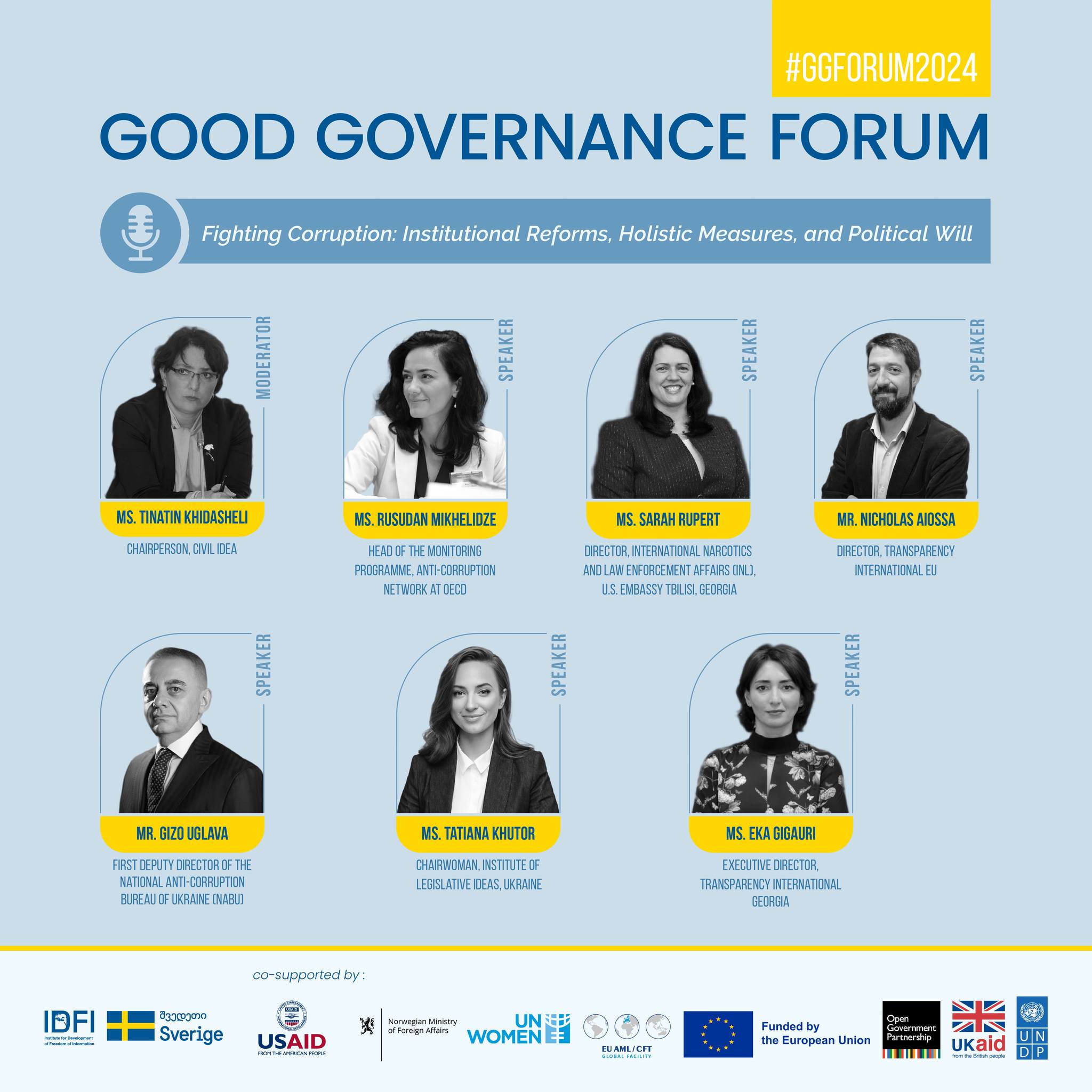
The first panel session, named Fighting Corruption: Institutional Reforms, Holistic Measures, and Political Will, was moderated by Ms. Tinatin Khidasheli, Chairperson at Civil IDEA. The panel comprised representatives from various regional and international organizations whose field of work is related to anti-corruption activities:
Mr. Nickolas Aiossa, the Director of Transparency International EU opened the panel, discussing the various tools developed against corruption in the European Union over the last decade. He talked about the European Union's journey to the current situation, highlighted various opportunities and challenges, and emphasized that both EU member and candidate countries, including Georgia, should continue working towards progress.
Ms. Rusudan Mikheldze, the Head of Monitoring Programme of Anti-Corruption Network at OECD spoke about holistic approaches to corruption prevention, focusing on perspectives seen by the OECD, challenges in Eastern Partnership countries, and the effectiveness of reforms. She noted progress in this regard.
The conversation addressed examples of systemic corruption, emphasizing the necessity of reforms and correct personnel policies to combat it. The right approaches to corruption by Ukrainian state officials in the recent period were highlighted, and Ms. Tatiana Khutor, Chairwoman of Institute of Legislative Ideas from Ukraine, presented the Ukrainian case - Corruption, European Integration, and War.
Mr. Gizo Uglava, First Deputy Director of the National Anti-Corruption Bureau of Ukraine (NABU), discussed the example of Ukraine's anti-corruption efforts, highlighting contributing factors and reviewing the principles of NABU’s work, along with the architecture of Ukraine's existing anti-corruption system. He stressed the importance of understanding that combating systemic corruption requires more than just the efforts of law enforcement agencies; it necessitates comprehensive reforms and proper human resource policies.
Ms. Eka Gigauri, the Executive Director of Transparency International Georgia, mentioned Georgia's frontrunner position in anti-corruption reforms, citing past political will and proactive measures like publishing asset declarations and procurement information. However, she emphasized the lack of a holistic approach, noting the persistence of issues such as the independence of the judiciary and the prosecutor's office. She stressed the importance of addressing various sectors, including the judiciary, parliamentary oversight, and chief prosecutor appointment procedures, for effective anti-corruption efforts.
Participants observed that all countries worldwide, including developed nations, may have problems regarding corruption today. They noted that it is essential to continue the discussions on ways to address the problem and that it is very important for international cooperation and partnership in this regard.
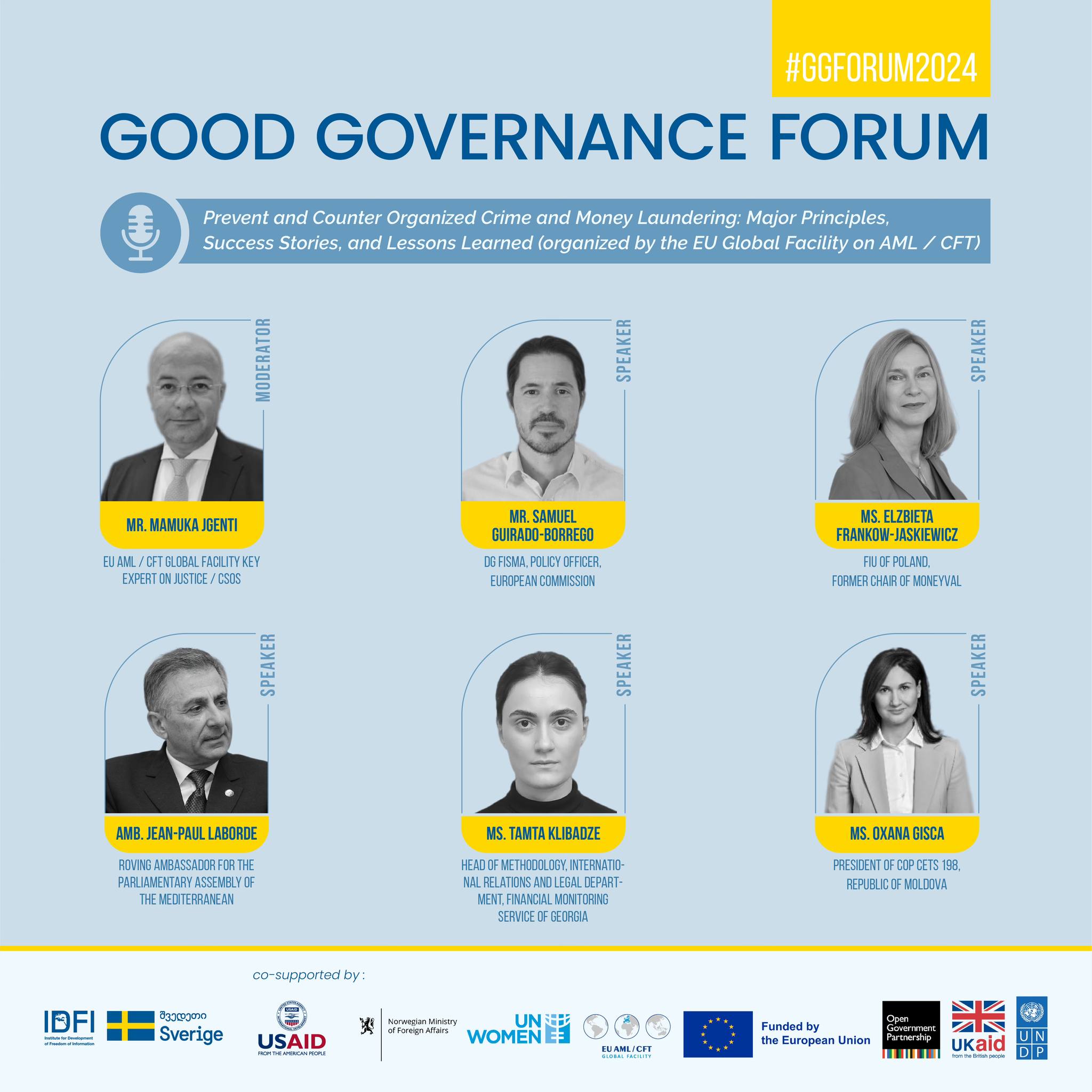
The second panel, titled - Prevent and Counter Organized Crime and Money Laundering: Major Principles, Success Stories, and Lessons Learned was organized by the EU Global Facility on AML/CFT and was moderated by Mr. Mamuka Jgenti - CFT Global Facility Key Exert on Justice and CSOs.
The panel focused on aligning national legislation with international standards in anti-money laundering and countering terrorist financing (AML/CFT). Amb. Jan-Paul Laborde, roving ambassador for the Parliamentary Assembly of the Mediterranean, emphasized the importance of judicial independence while stressing the need for judges to be well-informed and trained in tackling financial crimes. He advocated for specialized judges in AML/CFT matters to ensure effective adjudication. Ms. Tamta Klibadze, representative of the Financial Monitoring Service of Georgia, provided insights from Georgia's efforts, highlighting the establishment of a Standing Interagency Commission and the development of a National Strategy and Action Plan. Ms. Oxana Jisca, the newly appointed President of the Conference of the Parties (COP) to the CETS-198 shared Moldova's perspective, underscoring the significance of the Warsaw Convention on asset recovery and the need for countries to align with its provisions. She also urged Georgia to focus on implementing key provisions, such as corporate liability and negligent money laundering, while encouraging cross-sectoral cooperation. Ms. Elzbieta Frankow-Jaśkiewicz, former chair of MONEYVAL, FIU of Poland (The General Inspector of Financial Information), stressed the critical importance of harmonizing legislation with international standards for candidate countries, particularly in the context of the European Union accession process. She highlighted the necessity for comprehensive alignment with EU norms to facilitate a smooth integration process Mr. Samuel Guirado-Borrego, Police officer at the Financial Crime Unit at the European Commission highlighted the role of technological advancements in enhancing AML/CFT efforts, emphasizing the need for innovative solutions to combat evolving financial crimes.
The speakers collectively stressed the importance of ongoing capacity building, cross-border collaboration, and the implementation of robust legal frameworks to combat financial crimes effectively. They highlighted the need for continuous improvement and information sharing to address emerging threats and underscored the role of international cooperation in combating transnational financial crimes. At the end of the panel, important advice was provided to Georgia regarding its journey towards EU accession. The emphasis was on aligning with international AML/CFT standards, fostering cross-sectoral collaboration, and harnessing technological advancements to bolster efforts in combating financial crimes
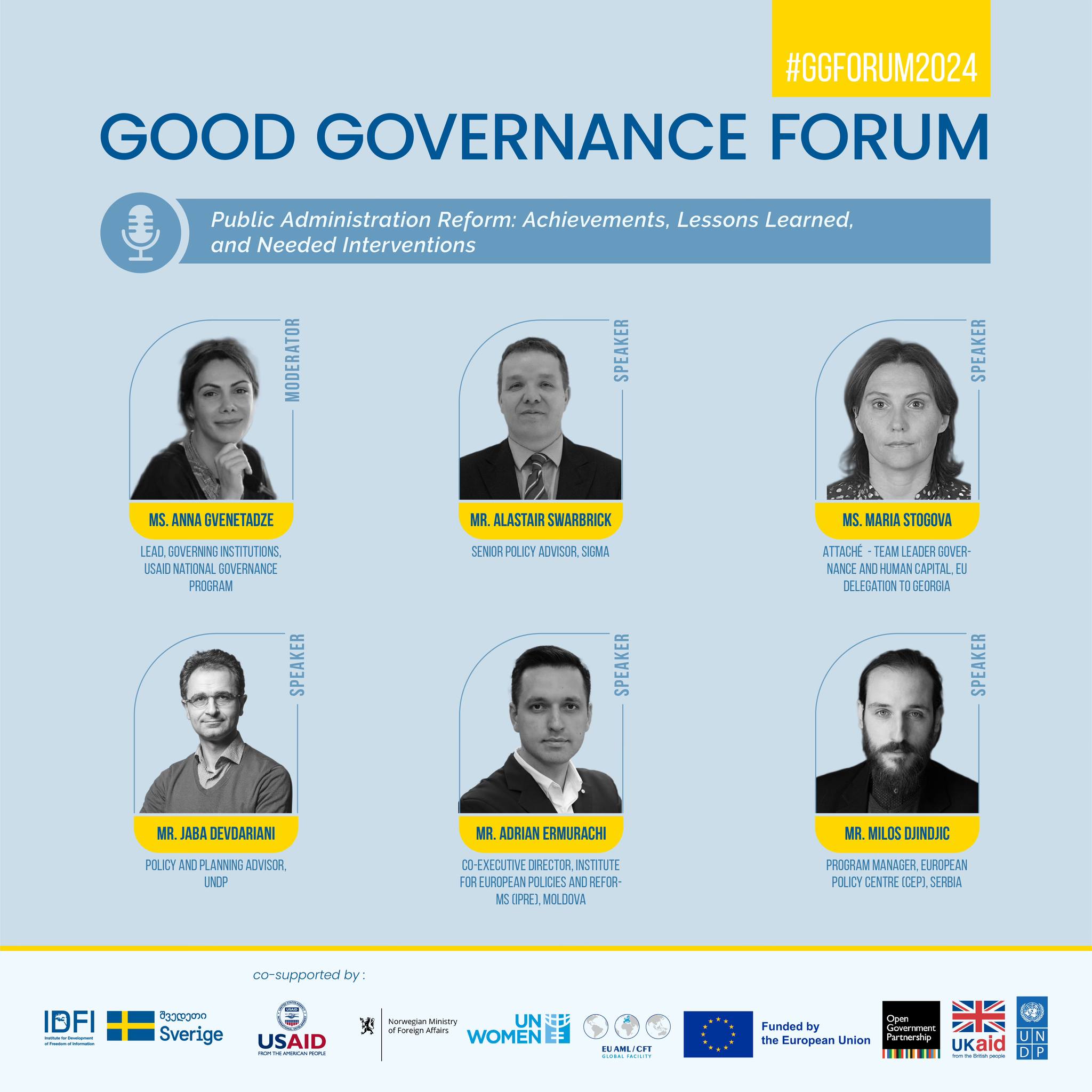
The third panel of the day, named Public Administration Reform: Achievement, Lessons Learned, and Need Interventions, was moderated by Ms. Anna Gvenetadze, Lead, Governing Institutions, USAID National Government Program.
The panel discussion delved into the multifaceted landscape of public administration reform (PAR) in Georgia, with a specific focus on its intersection with the country's aspirations for European Union (EU) integration. Mr. Alastair Swarbrick, Senior Policy Advisor at SIGMA began by underlining the pivotal role of PAR in fostering good governance, pointing out its implications for economic growth, innovation, and citizen engagement. He emphasized the necessity of strategic planning, efficient financial management, and capacity building within public institutions to ensure the success of PAR initiatives. Additionally, he provided insights into the updated principles of public administration, noting a shift towards a more results-oriented and values-based approach, with increased emphasis on emerging topics such as digitalization and sustainability. He noted that the evaluation of Georgia's adherence to the revised PAR principles is scheduled for September 2024.
Ms. Maria Stogova, Attache - Team Leader Governance and Human Capital, from the EU Delegation to Georgia, underscored the importance of viewing the attainment of candidate country status as the beginning of a new phase rather than the culmination of past efforts. She emphasized the imperative of continued reforms, particularly in the realms of anti-corruption measures and the reinforcement of governance institutions. She highlighted the moderate advancements in PAR in Georgia while identifying areas ripe for enhancement, including the refinement of legal entities of public law and the augmentation of digitalization strategies. Moreover, she advocated for intensified efforts in strengthening oversight mechanisms and urged stakeholders to thoroughly examine the recommendations outlined in the EU's assessment report, fostering collective engagement in pursuit of sustained improvement.
Mr. Milos Djindjic, the Program Manager of the European Policy Centre (CEP) from Serbia, drew from Serbia's experience to underscore the critical importance of external pressure from the EU in driving comprehensive reform efforts, particularly in the realm of PAR. He emphasized that such external push played a pivotal role in shaping the strategic direction of reform initiatives. Additionally, Mr. Djindjic highlighted the value of assessments like SIGMA in providing important insights for reform endeavors and underscored the pivotal role of civil society in ensuring transparency and accountability throughout the process.
Mr. Adrian Emurachi, the Co-Executive Director of Institute for European Policies and Reforms (IPRE), Moldova, provided insights into Moldova's approach to PAR, emphasizing the significance of a strategic approach to reform efforts. He highlighted the implementation of two strategies over the past decade and outlined progress made in adopting clear normative frameworks and revising government structures in alignment with SIGMA principles. Moreover, Mr. Emurachi highlighted the establishment of coordination platforms for European integration at both government and presidential levels as a key element in advancing Moldova's European integration process.
Overall, the panel discussion underscored the multifaceted nature of PAR, its intrinsic connection to EU integration goals, and the importance of sustained efforts, collaboration, and adaptation to drive meaningful progress in governance reform.
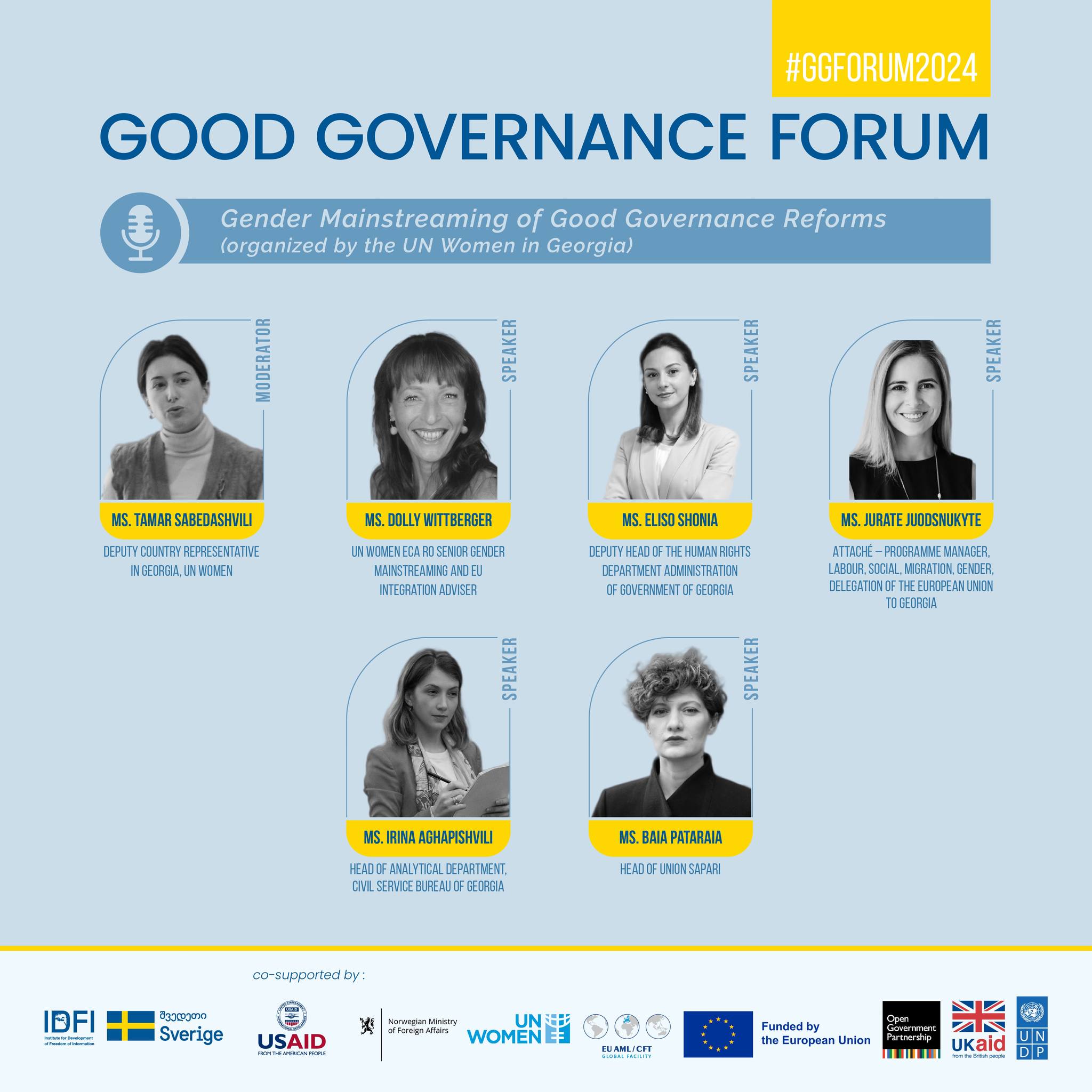
The first panel for the second day of the Forum was - Gender Mainstreaming of Good Governance Reforms, organized by the UN Women Georgia and moderated by Ms. Tamar Sabedashvili, Deputy Country Representative in UN Women Georgia.
Ms. Dolly Wittberger, Senior Gender Mainstreaming and EU Integration Advisor at UN Women, initiated the discussion by acknowledging the problem of gender blindness in Georgian legislation. She emphasized the necessity of an institutional framework to effectively implement legislation and attain legislative goals. She further discussed the EU acquis that Georgia should adopt, stressing the critical need to harmonize EU legislation and national laws with regard to gender equality.
The representatives of the public sector - Irina Aghapishvili head of the Analytical Department at Civil Service Beaure of Georgia and Eliso Shonia Deputy Head of the Human Rights Department at the Administration of the Government of Georgia. outlined the measures their institutions have undertaken to promote gender equality and presented plans for further action, such as enhancing gender-specific statistical data.
Ms. Jurate Juodsnukyte, Programme Manager, Labour, Social, Migration, Gender from the EU Delegation to Georgia, admitted that there is still much work to be done regarding gender mainstreaming in Georgia. Ms. Baia Pataraia, the Head of Union Sapari, stated that the absence of a dedicated topic or chapter on gender on the EU integration path in Georgian reality is challenging due to the government's prioritization of other issues over gender concerns. She also highlighted the difficulty in fulfilling certain aspects of the EU acquis and the insufficient knowledge about gender issues in Georgia. In addition, the panel participants discussed action plans, noting that while they exist within the country, they lack thorough analysis and resources for effective monitoring of implementation.
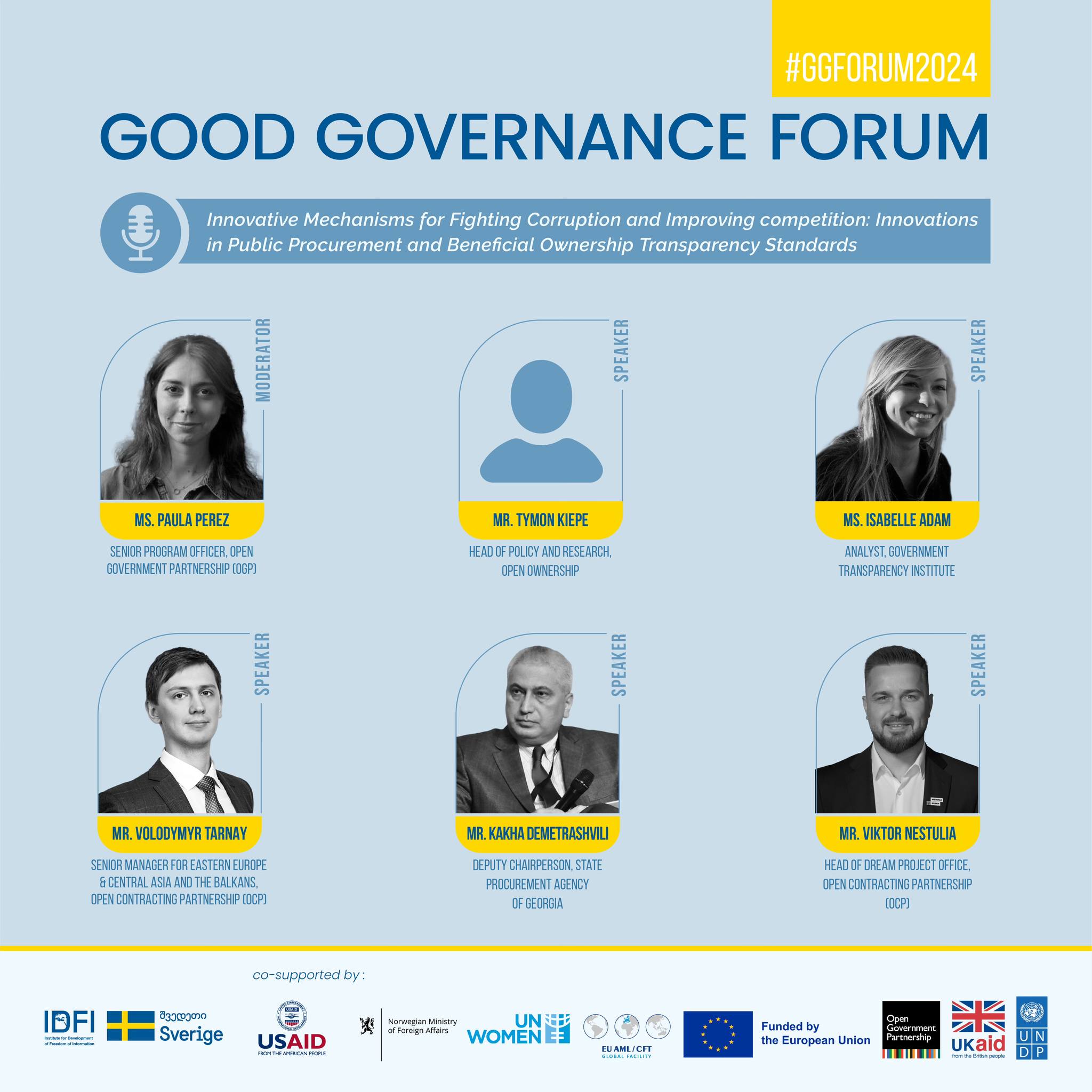
The second panel of the day, titled Innovative Mechanisms for Fighting Corruption and Improving competition: Innovations in Public Procurement and Beneficial Ownership Transparency Standards, was moderated by Ms. Paula Perez, Senior Program Officer from the Open Government Partnership (OGP).
The panel discussion focused on innovative mechanisms to address corruption and transparency of the government. The moderator underscored ongoing efforts within the Open Government Partnership (OGP) framework and emphasized the significance of transparency and accountability in government processes. Key priorities, including combating corruption in procurement and advancing beneficial ownership transparency reforms, were highlighted. These priorities were not only seen as technical matters but also as crucial elements impacting broader areas such as investigative journalism, sanctions implementation, and inclusive governance.
Mr. Kakha Demetrashvili, the Deputy Chairperson of the State Procurement Agency of Georgia, provided insights into Georgia's procurement system reforms, emphasizing the country's unique context and the need for tailored approaches. He discussed Georgia's advanced e-governance infrastructure, legislative reforms, and plans for stakeholder engagement and human capital development.
Ms. Isabelle Adam, Analyst at the Government Transparency Institute emphasized the importance of robust data structures for analyzing procurement data and identifying corruption risks. She discussed the Government Transparency Institute's experience in collecting and analyzing global procurement data and outlined two main uses of data analytics: risk assessment and policy advice. Isabelle also identified four key issues affecting data quality: availability, scope, legal thresholds, and accuracy.
Mr. Volodymir Tarnay, Senior Manager for Eastern Europe & Central Asia and Balkans at Open Contracting Partnership (OCP), shared innovative approaches to public procurement, focusing on the implementation of AI and digitalization in Ukraine's procurement system. He discussed the ProZorro platform and highlighted successful cases of procurement reform in Kazakhstan, emphasizing the importance of data quality and analytical infrastructure in supporting decision-making.
Mr. Tymon Kiepe, the Head of Policy and Research at Open Ownership, discussed practical insights on implementing beneficial ownership transparency reforms, emphasizing the alignment of transparency initiatives with broader policy goals. He underscored the diverse applications of beneficial ownership information and advocated for standardization to ensure interoperability and usability across jurisdictions.
Mr. Victor Nestulia - Head of DREAM Project Office, Open Contracting Partnership (OCP) highlighted the challenges posed by the Russian invasion and the extensive reconstruction needs. He emphasized the necessity for coordination with international partners and introduced the DREAM project, a comprehensive system for managing public investments in Ukraine. DREAM aims to facilitate transparency, stakeholder engagement, and accountability throughout the entire infrastructure investment process, from planning to implementation.
In conclusion, the panelists emphasized the critical need to build capacity and skills for effectively utilizing data in combating corruption and achieving transparency. They highlighted the importance of integrating data analysis into educational processes, collaborating with relevant institutions.
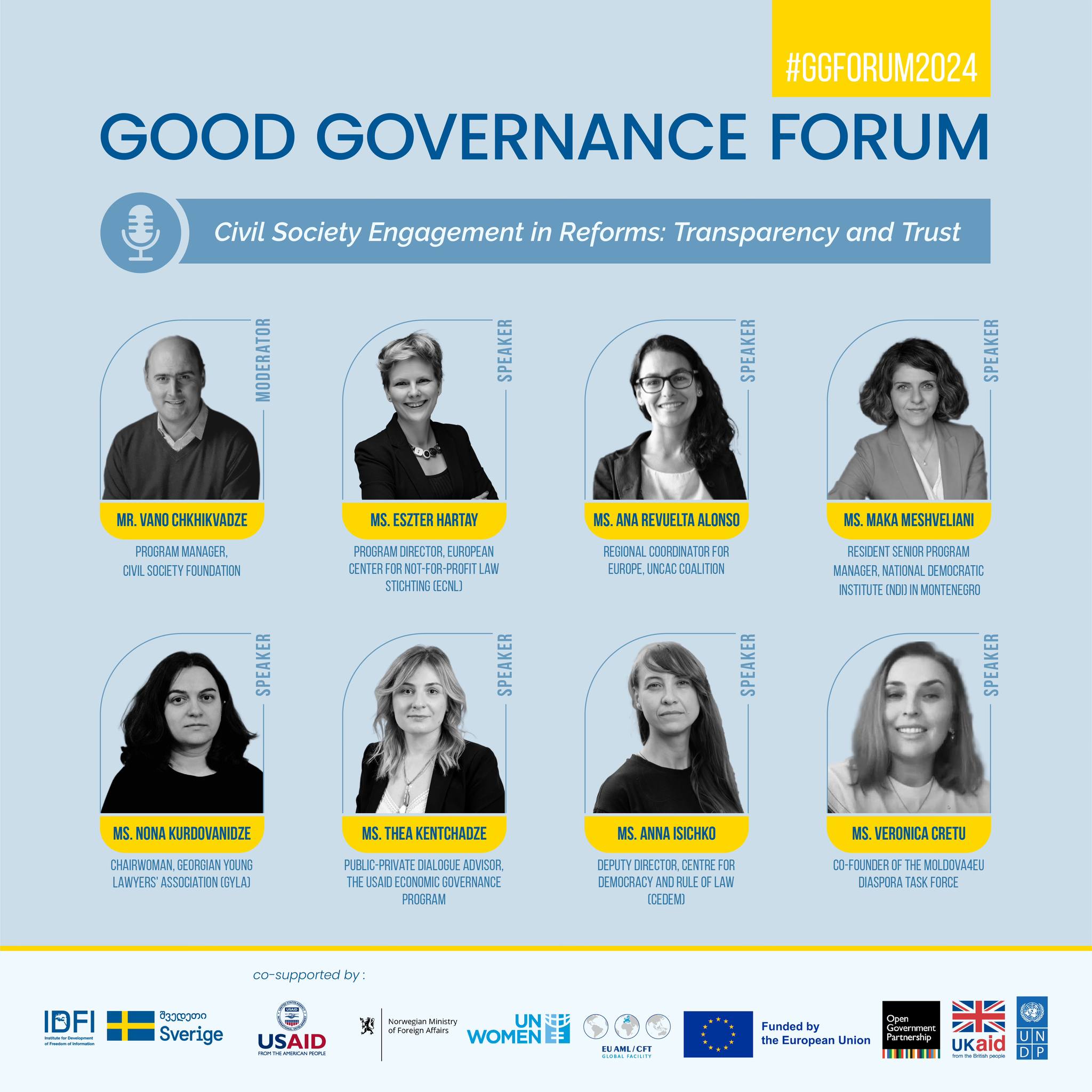
The third panel of the day, named - Civil Society Engagement in Reforms: Transparency and Trust, was moderated by Vano Ckhkikvadze, Program Manager at Civil Society Foundation.
Ms. Thea Kenchadze, Public-Private Dialogue Advisor at the USAID Economic Governance Program, emphasized the importance of collaboration in achieving credible reforms. She outlined the focus areas of the USAID Economic Governance Program, including governmental capacity building, civil society strengthening, and policy support. She stressed the significance of incorporating voices from civil society and the private sector in reform processes, highlighting successful engagements such as public-private dialogue mechanisms. She underscored the program's commitment to locally-led development and the promotion of evidence-based policies that benefit the people of Georgia. Additionally, she mentioned a joint project with IDFI (Institute for Development of Freedom of Information), emphasizing their collaboration in implementing a public-private dialogue mechanism for monitoring the quality and extent of engagement in elaborating laws and normative acts.
Ms. Nona Kurdovanidze, the Chairwoman of Georgian Young Lawyers’ Association (GYLA), highlighted the significance of the environment for civil society organizations (CSOs) and the political will to ensure their inclusion in reform implementation processes. She pointed out that Georgia is encountering significant challenges, with frequent instances of civil space restrictions. Additionally, she mentioned that the government tends to portray CSOs' activities as detrimental to the country's interests. Ms. Kurdovanidze emphasized that the government often disregards CSOs' recommendations, citing the example of judicial reform, where her organization's recommendations were completely ignored during the drafting stage.
Ms. Eszter Hartey, the Program Director at the European Center for Not-for-Profit Law Stichting (ECNL), highlighted three building blocks for effective participation: independent civil society, good processes, and good tools. Ms. Hartey emphasized the importance of an enabling environment for civil society organizations to operate independently and the need for clear processes that are inclusive and impactful. She also discussed the use of technology in enhancing participation and expressed concerns about restrictions on civil society engagement in some countries. Ms. Hartey provided examples of successful civil society advocacy efforts, including the prevention of the adoption of the foreign agent law in Georgia and advocacy related to the EU Artificial Intelligence Act. She emphasized the importance of investing in participation in the EU policies and processes.
Ms. Ana Revuelta Alonso, the Regional Coordination for Europe at UNCAC Coalition, highlighted the role of civil society in anti-corruption efforts globally, focusing on the implementation of the United Nations Convention Against Corruption (UNCAC). She emphasized the diverse ways civil society organizations contribute to political integrity and policy reforms, including through parallel reports on UNCAC implementation, promoting transparency in beneficial ownership and public procurement, investigative reporting, and research. She also proposed concrete actions for meaningful collaboration between governments and civil society, including signing and complying with the UNCAC Coalition Transparency Pledge, organizing public discussions on recommendations, and utilizing international platforms, such as the EU accession process and the Open Government Partnership.
Ms. Maka Meshvelian, Resident Senior Program Manager at National Democratic Institute (NDI) in Montenegro, highlighted the role of civil society in advancing good governance reforms in the country. She discussed the challenges faced in Montenegro's path towards EU accession, including political instability and limited progress in negotiations. She also emphasized the importance of civil society engagement in initiatives such as the Open Government Partnership (OGP) to advocate for reforms and promote transparency.
Ms. Anna Isichko, the Deputy Director at the Centre for Democracy and Rule of Law (CEDEM), emphasized the significant role of Ukrainian civil society in advancing reforms amidst the ongoing war. She highlighted successful reforms in media, decentralization, and anti-corruption despite challenging circumstances. Civil society's active involvement in decision-making processes and collaboration with the government and parliament were underscored, with examples of legislative cooperation and consultation. Ms. Isichko also emphasized Ukraine's swift progress in EU integration, noting civil society's integral role in the process and international recognition of Ukraine's civil society efforts.
Ms. Veronica Cretu, Co-Founder of the Moldova4EU Task Force, highlighted the importance of civil society participation in reporting processes, drawing from her experience in various national and global platforms. She emphasized the value of both organized platforms and ad hoc initiatives in providing legitimacy, capacity building, and networking opportunities for civil society organizations. Organized platforms offer formal recognition and structure, fostering long-term collaboration, while ad hoc initiatives enable flexibility and agility in responding to emerging issues. However, sustaining momentum and engagement in ad hoc initiatives can be challenging without adequate institutional support. Ms. Cretu underscored the need for consistent efforts to address challenges of representation, access, and inclusivity to ensure effective civil society engagement at all levels.
At the end of each day, thematic workshops were conducted for interested participants. On the first day, two workshops took place:
Public Procurement Workshop, facilitated by Mr. Giorgi Kldiashvili - Participants had the opportunity to gain insights into the practices of public procurement in Georgia, Ukraine, and Moldova.
Advancing Open Government: A Practical Toolbox, facilitated by Paula Prezer from OGP - Attendees acquired practical knowledge about monitoring tools, such as the data tool by OGP, and gained detailed information about the OGP Initiative.
On the second day three workshops were held:
Gender Workshop organized by UN WOMEN Georgia and led by Ms. Dolly Wittberger. Dolly explored practical approaches and methodologies that can be utilized to effectively incorporate gender mainstreaming into governance reforms. She presented tangible guidance and requirements the EU aspirant countries have to consider by identifying and addressing gender-specific challenges that may arise during the EU accession process.
Public Administration Reform Workshop was facilitated by Mr. Alistair Swarbrick from SIGMA/OECD. During the workshop, attendees gained an understanding of the core changes to updated public administration principles by SIGMA. Discussions were also held regarding SIGMA's forthcoming assessment of Georgia in September 2024.
Open Contracting Partnership Workshop, facilitated by Mr. Volodymyr Tarnay from OCP - The session delved into innovative mechanisms within public procurement. The speaker elaborated on the functioning of the innovative platform Prozorro and emphasized the critical role of data in monitoring public procurement processes.
Please find the video featuring major takeaways from the Forum.
Please find the panel recordings:
Opening Remarks and Panel 1: Fighting Corruption: Institutional Reforms, Holistic Measures, and Political Will
Panel 3: Public Administration Reform: Achievement, Lessons Learned, and Need Intervention
Panel 6: Civil Society Engagement in Reforms: Transparency and Trust
Please find the event photo album
Find the Full Program